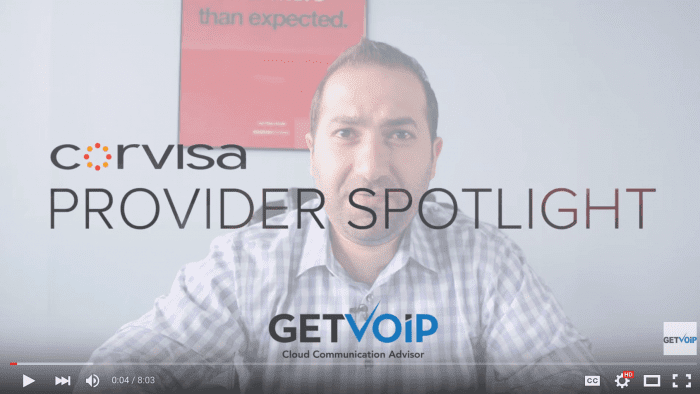Welcome to our provider spotlight series, where we take an in-depth look at a communication service provider by sitting down with the head of the company. In this edition of our provider spotlight series, we talked to Matt Lautz, President and Chief Information Officer of Corvisa. Matt helped found Corvisa in 2009, and also helped found IVR Central in 2010, both companies which were later acquired by investment companies. Matt is now also the CIO of Corvisa's parent company, Novation.
Corvisa fits the stereotype of the hip startup. Nerf guns? Check. Foosball table? Check. Offering code-level access in order to create customized real-time communication apps? Check. Corvisa is the only combined Software-as-a-Service and Platform-as-a-Service available today. Its built on the Summit development platform, so it can be completely customizable, and it's backed by carrier-grade reliability.
Writing your own code to make an app may sound intimidating—but it's not. All it takes is five lines of code to make a fully-functional voice app. From there, the developer-friendly platform lets you build unique voice and text apps that are made specifically for your business needs. Corvisa's Summit Platform lets you configure your VoIP to do exactly what you need it to do.
In our interview with Matt, we asked what makes Corvisa stand out, and what customers would benefit the most from subscribing. As you'll find out, the larger companies with an international footprint are the target customers, but of course, no business is too small for them, and they have many small business subscribers. We find out what it's like to deploy Corvisa, and learn how easy it is to get started with them. Corvisa isn't content to just provide you with a phone service, they take the time to pro-actively engage and educate their subscribers. Find out more about what makes Corvisa unique by joining us for this one-on-one interview.
A lot of our prospects have traditionally had to work with 3 or 4 vendors. They had to work with a separate PBX vendor, they worked with a separate cloud contact center solution, and then any time they wanted to truly build something themselves and something unique they’ve tended to have to work with a cloud communication API provider who can give them that flexibility and really a key differentiator for us, and what a lot of our clients really love is our ability to provide all of that.
That we provide a full platform, that we built our products on top of, but they don't have to build it all themselves they can start with a product and tailor those few things that they wanted to do themselves.
Cloud communication provider really designed around flexibility, scalability, and providing the solution the client wants.
When you look at the VoIP as an overall market, whether you call it VoIP or UC, is that term, tends to be crowded. When you really get into the true players that are capable with clients with more complex needs the market of competitors starts to shrink. What we really find, as being important, is that ability to differentiate in a few key areas. Scalability. Reliability. International. Single Source.
Our ideal customer tend to be the mid few hundred users up to the thousands. We do focus more on the enterprise market. We absolutely have great clients that are two, five, ten seats but we tend to focus on the mid-size to larger enterprises
Our retail pricing averages between $20-$25 a month for US customers. That includes 24/7 support, which includes access to our team for whatever you might need. We do have packages that include physical hard phones.
We are very concerned about ensuring that our clients received the implementation support they need regardless of what size they are. Everyone of our clients gets a dedicated implementation manager, our clients are walk-through that implementation process and then a period of time after they go live they have that dedicated implementation manager to support them. The second is customer support. We really believe in a proactive customer support model as well as the obvious reactionary you have to do when someone calls in. We do provide 24/7 localized support for our US based customers. This is really important to us is we have a consulting group within our company and to make sure we are not just going down a checklist of here are the things customer asks for but were coming in and challenging the customer with ‘ have you thought about this’, ‘did you know this technology exists’, ‘ how would you be able to differentiate your service offering as a customer of ours if you were able to utilize this.’ So a big part of what we try to do up front is obviously answer every question the customer asks for and but we also want to make sure that we are helping them understand what they may not even know exists.
We definitely have a casual culture, we are definitely a group that it’s about working hard but also working hard and playing. A lot of cultures starts with environment and then I think it also heavily dictated on how much senior management is involved and so from a physical environment level were very big on having stand-up workstations, relaxation areas, places for people to not just look at their watches and want to leave. Put in the extra time because it helps the customer.
Ill tell you one of our most recent ones that’s been really well received is our real-time web socket. Its a technical answer and I‘ll explain why its beneficial. We give access real-time to every event in our product that customers can interact with their own development so a lot of folks are integrating that into their own analytics. Their tying that into their own application, so every time a call hits a call cue it sends off an event, every time a call is answered, every time a call is abandoned, a user logs in, logs out etc. In some of those maybe done in reports or web services that you pull every 5, 10, 15 minutes, those are real-time events that are published and will be made available within milliseconds. So what it's allowed our customer to do a new levels of integrations to their own business intelligence applications and build their own integration that they’ve not been able to do in the past. It’s for real-time events feed.
I think the must know is about doing it differently. Were listening to what people want and were building a true platform for our customers to interface with and were going to treat you the way you deserve to be treated. We believe that you should have the customer support you deserve for how important this is to your business. We believe you should have the access to your data which is why we’ve done things like real-time events. We believe that you should have flexibility and believe it should work whether your two users or two thousand.



